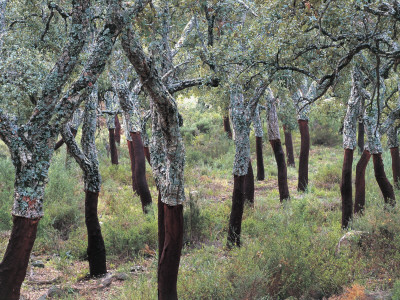No veg box yesterday as we haven't finish all the veg from last week! Instead of food I'm thinking about drinks. Today I'm off to a fancy dress party. I'm no wine expert but there's so much choice that surely there's an environmentally friendly option I can find. As well as taste and price there are several key things I look for in a good bottle, but having researched it a little harder some things aren't as simple as I first thought. Over the next two days I'll look at a few of the environmental issues connected to wine.
The first thing I look at is what's in the top of my bottle. In the past 20 years there's been a huge expansion in the number of products used for bottle closure. Before I was born cork was used almost exclusively, and that cork was produced just as exclusively from countries on the Mediterranean, mostly Spain and Portugal. Nowadays screw caps, plastic corks and glass stoppers are easy to find on the shelves so is one better than another and why the sudden change?
Cork monopolised the market for centuries but about 20 years ago scientists discovered TCA, a chemical which taints wine and causes it to go off. TCA is estimated to be in 1-10% of corks and currently cannot be identified before the cork is put into the bottle, you only know it's there when the wine goes off. This problem forced producers to start looking for other ways to seal their bottles.
The most common alternatives are plastic corks and screw tops. Screw tops have the added advantage that you can easily reseal the bottle if you only want a glass so is seen as better than cork for reasons other than a lack of TCA. Plastic corks are designed to look, feel and pop like natural corks. I hate plastic corks. Something about the very fake, plastic feel puts me off, especially when it's set against the almost natural feel of the glass wine bottle. I also can't help thinking that making plastic corks isn't the best use of the world's limited oil resources.
So I don't mind screw tops and I hate plastic, but is there any environmental reason for picking one type
over another. Other than the fact that cork is renewable while metal screw tops and plastic corks aren't there's also another benefit of using cork. The cork oak forests in Spain and Portugal are facing serious danger since the cork percentage of the closure market dropped. The cork oaks of southern Spain are rich in insects, birds, mammals and plants as the production of cork is naturally kind to the surrounding environment. Cork is the stripped bark from the oak trees and this must be done carefully to preserve the trees health. This means that the trees are left safe for wildlife to use while cork can be harvested for decades without ill effects. With a drop in cork demand these ancient forests might be lost forever if the land use is forced to change and with it we could lose the Iberian Lynx, the Iberian Imperial Eagle and the Barbary Deer.
Having seen this beautiful, rare environment in the past I know it's worth protecting so I'm going to try and buy cork wine whenever I can. But is it environmentally friendly to ship cork out to countries that don't produce it themselves, or is it better for Chilean and Australian wines to use screw tops? More on this tomorrow.
 |
| Spanish cork oaks. The dark lower trunk had already had it's cork stripped. |
No comments:
Post a Comment